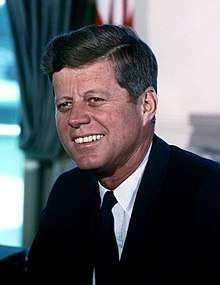1960 Democratic Party presidential primaries
The 1960 Democratic presidential primaries were the selection process by which voters of the Democratic Party chose its nominee for President of the United States in the 1960 U.S. presidential election. Senator John F. Kennedy of Massachusetts was selected as the nominee through a series of primary elections and caucuses culminating in the 1960 Democratic National Convention held from July 11 to July 15, 1960, in Los Angeles, California.
| |||||||||||||||||||
| |||||||||||||||||||
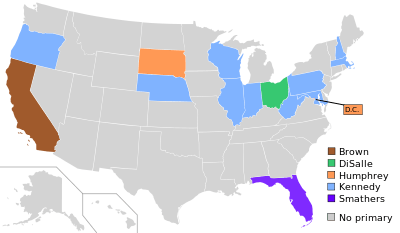 Primaries by state | |||||||||||||||||||
| |||||||||||||||||||
Primary race
Recalling the experience of 1928 Catholic Democratic presidential nominee Al Smith, many wondered if anti-Catholic prejudice would affect Kennedy's chances of winning the nomination and the election in November. To prove his vote-getting ability, Kennedy challenged Minnesota Senator Hubert Humphrey, a liberal, in the Wisconsin primary. Although Kennedy defeated Humphrey in Wisconsin, the fact that his margin of victory came mostly from heavily Catholic areas left many party bosses unconvinced of Kennedy's appeal to non-Catholic voters. Kennedy next faced Humphrey in the heavily Protestant state of West Virginia, where anti-Catholic bigotry was said to be widespread. Humphrey's campaign was low on money and could not compete with the well-organized, well-financed Kennedy team. Kennedy's attractive sisters and brothers combed the state looking for votes, leading Humphrey to complain that he "felt like an independent merchant running against a chain store."[1] On primary day, Kennedy crushed Humphrey with over 60% of the vote. Humphrey withdrew from the race and Kennedy had gained the victory he needed to prove to the party's bosses that a Catholic could win in a non-Catholic state. In the months leading up to the Democratic Convention Kennedy traveled around the nation persuading delegates from various states to support him. However, as the Convention opened, Kennedy was still a few dozen votes short of victory.
Although Kennedy won primaries by comfortable margin, his main opponent, Senate Majority Leader Lyndon B. Johnson, who did not participate in primaries, had a very strong base in party establishment and gained many delegates. Johnson did not join any primary, but was a write-in.[2]
Candidates
The following political leaders were candidates for the 1960 Democratic presidential nomination:
Major candidates
These candidates participated in multiple state primaries or were included in multiple major national polls.
Competing in primaries
| Candidate | Most recent position | Home state | Campaign | ||
|---|---|---|---|---|---|
| John F. Kennedy | 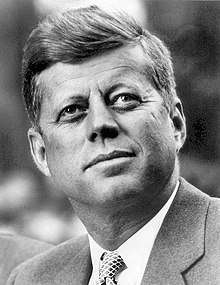 |
U.S. Senator from Massachusetts (1952–61) |
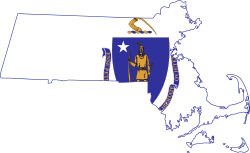 Massachusetts |
(Campaign) | |
| Hubert Humphrey | 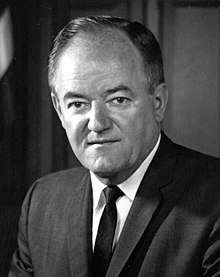 |
U.S. Senator from Minnesota (1949–64) |
 Minnesota |
 (Campaign) | |
| Wayne Morse | 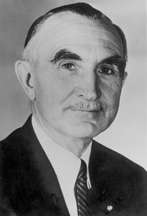 |
Senator from Oregon (1945–69) |
 Oregon |
(Campaign) | |
Bypassing primaries
The following candidates did not place their name directly on the ballot for any state's presidential primary, but may have sought to influence to selection of un-elected delegates or sought the support of uncommitted delegates.
| Candidate | Most recent position | Home state | Campaign | |
|---|---|---|---|---|
| Lyndon B. Johnson | 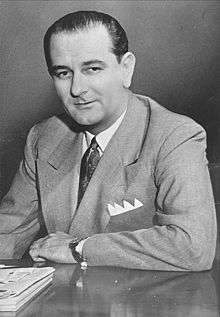 |
U.S. Senator from Texas (1949–61) |
 Texas |
 (Campaign) |
| Adlai Stevenson II | 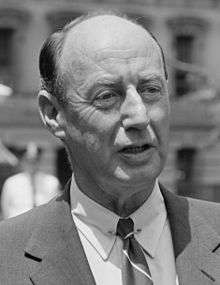 |
Former Governor of Illinois (1949–53) |
 Illinois |
(Campaign) |
| Stuart Symington | 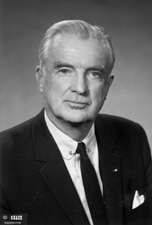 |
U.S. Senator from Missouri (1953–76) |
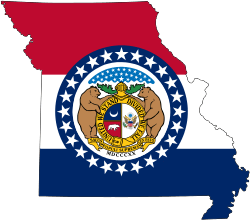 Missouri |
(Campaign) |
| Robert B. Meyner[3] |  |
Governor of New Jersey (1954–62) |
New Jersey |
(Campaign) |
Favorite sons
The following candidates ran only in their home state's primary or caucus for the purpose of controlling its delegate slate at the convention and did not appear to be considered national candidates by the media.
- Governor Ross Barnett of Mississippi
- Governor Pat Brown of California (pledged support to Kennedy)
- Governor Michael DiSalle of Ohio (pledged support to Kennedy)
- Governor Herschel Loveless of Iowa
- George H. McLain of California
- Albert S. Porter of Ohio
- Senator George Smathers of Florida
Declined to run
The following persons were listed in two or more major national polls or were the subject of media speculation surrounding their potential candidacy, but declined to actively seek the nomination.
- Senator Joseph Clark of Pennsylvania
- Former Governor Frank G. Clement of Tennessee
- Governor Orval Faubus of Arkansas
- Senator Albert Gore of Tennessee
- Former Governor W. Averell Harriman of New York
- Senator Estes Kefauver of Tennessee
- Governor Edmund Muskie of Maine
- Governor G. Mennen Williams of Michigan
Polling
National polling
| Poll source | Publication | |||||||||
|---|---|---|---|---|---|---|---|---|---|---|
| Gallup[4] | Aug. 11, 1957 | – | 5% | 29% | 23% | 8% | – | 5% | 14%[lower-alpha 1] | 16% |
| Gallup[5] | Nov. 16, 1957 | – | 3% | 26% | 19% | 11% | – | 5% | 15%[lower-alpha 2] | 21% |
| Gallup[6] | June 11, 1958 | – | 3% | 16% | 19% | 12% | 23% | 4% | 8%[lower-alpha 3] | 15% |
| Gallup[7] | Nov. 30, 1958 | – | 1% | 11% | 23% | 6% | 29% | 5% | 11%[lower-alpha 4] | 14% |
| Gallup[8] | Jan. 25, 1959 | – | 4% | 10% | 25% | 7% | 29% | 4% | 12%[lower-alpha 5] | 9% |
| Gallup[9] | April 5, 1959 | – | – | 12% | 28% | 9% | 27% | 5% | 11%[lower-alpha 6] | 9% |
| Gallup[10] | May 18, 1959 | – | 5% | 10% | 25% | 13% | 26% | 7% | 6%[lower-alpha 7] | 8% |
| Gallup[11] | June 10, 1959 | – | 6% | – | 26% | 12% | 29% | 4% | 6%[lower-alpha 8] | 8% |
| Gallup[12] | July 9, 1959 | – | 4% | 11% | 29% | 14% | 25% | 6% | 4%[lower-alpha 9] | 7% |
| Gallup[13] | Aug. 14, 1959 | 2% | 5% | 9% | 26% | 12% | 26% | 7% | 6%[lower-alpha 10] | 7% |
| Gallup[14] | Sep. 27, 1959 | 1% | 5% | 9% | 30% | 10% | 26% | 6% | 8% | 5% |
| Gallup[15] | Nov. 18, 1959 | 3% | 4% | 10% | 27% | 11% | 26% | 6% | 5%[lower-alpha 11] | 8% |
| Gallup[16] | Dec. 18, 1959 | 3% | 4% | 10% | 24% | 14% | 26% | 5% | 4%[lower-alpha 12] | 10% |
| Gallup[17] | Jan. 29, 1960 | 2% | 5% | 6% | 32% | 12% | 28% | 6% | 3%[lower-alpha 13] | 6% |
| Gallup[18] | Feb. 26, 1960 | – | 6% | 6% | 35% | 13% | 23% | 5% | 5%[lower-alpha 14] | 7% |
| Gallup[19] | March 27, 1960 | 3% | 5% | – | 34% | 15% | 23% | 6% | 6% | 8% |
| Gallup[20] | April 20, 1960 | 3% | 7% | – | 39% | 11% | 21% | 6% | 5% | 8% |
| Gallup[21] | May 27, 1960 | – | 7% | – | 41% | 11% | 21% | 7% | 9% | 4% |
- Frank Clement with 6%, G. Mennen Williams with 4%, Edmund Muskie with 2%, Robert Meyner and Robert Kerr combined for 2%
- Frank Clement with 6%, Robert Meyner with 3%, and 6% combined for Happy Chandler, G. Mennen Williams, and Robert Kerr
- Frank Clement with 4%, Robert Meyner and G. Mennen Williams combined for 4%
- G. Mennen Williams with 5%, Orval Faubus with 4%, and Robert Meyner with <2%
- G. Mennen Williams with 5%, Orval Faubus with 5%, and Robert Meyner with 2%
- Combined for Orval Faubus, Hubert Humphrey, Robert Meyner, and G. Mennen Williams
- Combined for G. Mennen Williams, Orval Faubus, and Robert Meyner
- Combined for Robert Meyner and G. Mennen Williams
- Combined for Robert Meyner and G. Mennen Williams
- Robert Meyner with 3%, G. Mennen Williams with 3%
- G. Mennen Williams with 3% and Robert Meyner with 2%
- Robert Meyner with 2% and G. Mennen Williams with 2%
- G. Mennen Williams with 2% and Robert Meyner with 1%
- Robert Meyner with 2%; Pat Brown, G. Mennen Williams, Wayne Morse, and Chester Bowles combined for 3%
Two-way races
Kennedy v. Kefauver
| Poll source | Date(s) | |||
|---|---|---|---|---|
| Gallup[22] | Feb. 7, 1958 | 35% | 56% | 9% |
Kennedy v. Johnson
| Poll source | Date(s) | |||
|---|---|---|---|---|
| Gallup[23] | Feb. 28, 1960 | 32% | 58% | 10% |
Kennedy v. Stevenson
| Poll source | Date(s) | |||
|---|---|---|---|---|
| Gallup[24] | Dec. 3, 1958 | 42% | 42% | 16% |
| Gallup[25] | Feb. 6, 1959 | 44% | 45% | 1% |
| Gallup[26] | June 12, 1959 | 45% | 44% | 11% |
| Gallup[23] | Feb. 28, 1960 | 50% | 43% | 7% |
| Look magazine[27] | June 21, 1960 | 59% | 20% | 21% |
Johnson v. Symington
| Poll source | Date(s) | |||
|---|---|---|---|---|
| Gallup[23] | February 28, 1960 | 47% | 28% | 25% |
Statewide polling
West Virginia
| Poll source | Date(s) | Sample size[lower-alpha 1] |
||||
|---|---|---|---|---|---|---|
| The Fayette Tribune[28] | May 6, 1960 | 181 A in Fayette County | 24% | 38% | – | 39% |
Wisconsin
| Poll source | Date(s) | Sample size[lower-alpha 1] |
|||||||
|---|---|---|---|---|---|---|---|---|---|
| Sen. William Proxmire[29] | Aug 5, 1959 | 1,311 A | 17% | 43% | 4% | 29% | 7% | – | – |
Primaries
States by winner
| John F. Kennedy | Pat Brown | Hubert Humphrey | George Smathers | Michael DiSalle | Unpledged | ||
|---|---|---|---|---|---|---|---|
| March 8 | New Hampshire | 85% | – | – | – | – | – |
| April 5 | Wisconsin | 56% | – | 44% | – | – | – |
| April 12 | Illinois | 65% | – | 8% | – | – | – |
| April 19 | New Jersey | – | – | – | – | – | 100% |
| April 26 | Massachusetts | 92% | – | 1% | – | – | – |
| April 26 | Pennsylvania | 71% | – | 4% | – | – | – |
| May 3 | Indiana | 81% | – | – | – | – | – |
| May 3 | Ohio | – | – | – | – | 60% | – |
| May 3 | D.C. | – | – | 57% | – | – | – |
| May 10 | Nebraska | 89% | – | 4% | – | – | – |
| May 10 | West Virginia | 61% | – | 39% | – | – | – |
| May 17 | Maryland | 70% | – | – | – | – | 8% |
| May 20 | Oregon | 51% | – | 6% | – | – | – |
| May 24 | Florida | – | – | – | 100% | – | – |
| June 7 | California | – | 67% | – | – | – | – |
| June 7 | South Dakota | – | – | 100% | – | – | – |
Total popular vote
Total number of vote in primaries:
candidates:
- John F. Kennedy - 1,847,259 (31.43%)
- Hubert Humphrey - 590,410 (10.05%)
- Unpledged delegates - 241,958 (4.12%)
- Wayne Morse - 147,262 (2.51%)
- Adlai Stevenson - 51,833 (0.88%)
"Favorite Sons:"
- Pat Brown - 1,354,031 (23.04%)
- George H. McLain - 646,387 (11.00%)
- George Smathers - 322,235 (5.48%)
- Michael DiSalle - 315,312 (5.37%)
Convention
Presidential nomination
Presidential tally:[30]
- John F. Kennedy: 806 (52.89%)
- Lyndon B. Johnson: 409 (26.84%)
- Stuart Symington: 86 (5.64%)
- Adlai Stevenson: 80 (5.25%)
- Robert B. Meyner: 43 (2.82%)
- Hubert Humphrey: 42 (2.76%)
- George Smathers: 30 (1.97%)
- Ross Barnett: 23 (1.51%)
- Herschel C. Loveless: 2 (0.13%)
- Pat Brown, Orval E. Faubus, Albert Dean Rosellini: each 1 vote
Notes
- Key:
A – all adults
RV – registered voters
LV – likely voters
V – unclear
References
- Schlesinger, Arthur M. (2002) [1978]. Robert Kennedy and His Times. New York: Houghton Mifflin Company. p. 195. ISBN 0-618-21928-5.
- Our Campaigns - US President - D Primaries Race - Feb 01, 1960
- Oliphant, Thomas; Wilkie, Curtis (2017). The road to Camelot: Inside JFK's Five-Year Campaign. Simon & Schuster.
- Gallup, George (11 Aug 1957). "Kefauver, Kennedy Tops in Party". The Washington Post. p. E5.
- Gallup, George (17 Nov 1957). "GALLUP POLL SHOWS: Kefauver Democratic Choice for 1960, Sen. Kennedy Second". Los Angeles Times. p. 21.
- Gallup, George (11 June 1958). "Stevenson Top Choice of Democratic Voters". Los Angeles Times. p. 15.
- Gallup, George (30 Nov 1958). "Stevenson Tops Poll of Democrats: Kennedy Leads in Gallup Survey of Independent Voters". Los Angeles Times.
- Gallup, George (25 Jan 1959). "STEVENSON LEAD IN POLL LOWERED: Kennedy Closes Gap Over November Gallup Rating; Still lndependents'-Choice". Los Angeles Times. p. A.
- Gallup, George (5 Apr 1959). "Kennedy, Stevenson Tie for Democratic Favor: Massachusetts Senator Gains Slightly, Gallup Poll Sampling Reveals". Los Angeles Times.
- Gallup, George (18 May 1959). "Stevenson, Kennedy Run Close: Gallup Poll Shows Johnson Third With Democrats". Los Angeles Times. p. 6.
- Gallup, George (10 June 1959). "Top Places Maintained by Stevenson, Kennedy". The Hartford Courant. p. 16.
- Gallup, George (9 July 1959). "Kennedy Moves Out Ahead of Adlai In Democrats' Rating for Nomination". The Washington Post. p. A21.
- Gallup, George (14 Aug 1959). "Kennedy and Stevenson Still Pace the Democrats". The Washington Post. p. D4.
- Gallup, George (27 Sep 1959). "Party Rates Kennedy No. 1". The Boston Globe. p. A3.
- Gallup, George (18 Nov 1959). "Stevenson Pulls Closer to Kennedy in Poll". The Hartford Courant. p. 16.
- Gallup, George (18 Dec 1959). "Kennedy Loses Ground Slightly, Johnson Gains". The Washington Post. p. A21.
- Gallup, George (29 Jan 1960). "Kennedy Scores Gain in Democrat Backing". Los Angeles Times. p. 6.
- Gallup, George (26 Feb 1960). "Kennedy Lead Gains as Democratic Choice". Los Angeles Times. p. 21.
- Gallup, George (27 Mar 1960). "Kennedy Keeps Lead in Democratic Vote". Los Angeles Times. p. A.
- Gallup, George (20 Apr 1960). "Kennedy Widens Lead in New Gallup Poll". Los Angeles Times. p. 24.
- Gallup, George (27 May 1960). "Kennedy In Same Spot As Previous Candidates". The Hartford Daily Courant. p. 17.
- Gallup, George (7 Feb 1958). "Kennedy Widens Lead Over Kefauver in Poll". Los Angeles Times. p. 24.
- Gallup, George (28 Feb 1960). "Kennedy Favored by Democrats". Los Angeles Times. p. B14.
- Gallup, George (3 Dec 1958). "Kennedy, Stevenson Tied As '60 'Show-Down' Choice". The Hartford Courant.
- Gallup, George (6 Feb 1959). "GALLUP POLL REPORTS:: Stevenson in Slight Gain on Sen. Kennedy". Los Angeles Times.
- Gallup, George (12 June 1959). "Stevenson, Kennedy in Close Race". Los Angeles Times. p. 17.
- "Poll Finds Nixon, Kennedy Favored". The Washington Post. 21 June 1960.
- Lawrence, W.H. (6 May 1960). "West Virginia Poll Finds Kennedy Gain". The New York Times. p. 1.
- "Kennedy, Nixon in Poll Lead". The Austin Statesman. 5 Aug 1959. p. 3.
- Our Campaigns - US President - D Convention Race - Jul 11, 1960
- White, Theodore (1961). The Making of the President 1960. Giant Cardinal. p. 212.
- Lawrence, W. H. (July 15, 1960). "Johnson is Nominated for Vice President; Kennedy Picks Him to Placate the South". The New York Times. Retrieved 11 September 2016.
